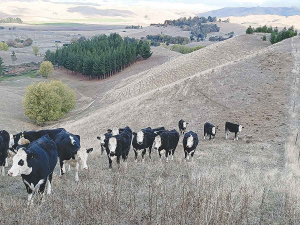Hawke’s Bay sheep and beef farmers warned to monitor stock water wells
Sheep and beef farmers in Hawke's Bay are being urged to keep a close eye on the wells that supply water to their stock.
 Hawkes Bay Rural Advisory Group chair Lochie MacGillivray says the group’s aim is to get every farmer through winter and save as much stock as possible.
Hawkes Bay Rural Advisory Group chair Lochie MacGillivray says the group’s aim is to get every farmer through winter and save as much stock as possible.
With $1 million now behind them, Hawkes Bay Rural Advisory Group is working to get as many farmers and livestock through winter as possible.
“We’ve got to get every farmer through the winter and save as much stock as possible.”
That’s what chair of the Hawkes Bay Rural Advisory Group (RAG), Lochie MacGillivray, told Rural News.
MacGillivray’s been tasked with dispensing the recently established $1 million special mayoral and government fund set up to pay for transporting much-needed stock feed to the drought-stricken region.
For MacGillivray, involvement in the group is a voluntary position – his real job is working as a consultant for AgFirst. Before that he was a Wool Board director and also farmed in the region.
He says the group will not be buying feed because doing that would simply distort the market.
MacGillivray told Rural News that farmers will have to source their own feed and get it to their farms. Once that it is done, they can then apply to have the cost of transporting it there refunded by the RAG.
“We want to help as many people who are vulnerable and genuinely in need of help and do this quickly and simply,” he says.
MacGillivray says because the fund is capped at $1 million, he can’t be all things to all people. He points out that there are 3,000 farmers in the region and if the fund was distributed evenly, that would mean people would get just $350 each – which he says is nothing.
“My focus is on those who are in need. That’s my first principle.”
He says the scheme has got to operate on a high trust model because RAG doesn’t have time or resources to monitor what people do. But he says the community itself will act as a monitor.
“People in the community will quickly spot somebody who applies for feed and they have got grass growing out of their eyeballs or if they have got all their trading stock on and they have got dollars in the bank then applying for assistance with feed,” he explains. “Those individuals will have to hang their heads pretty low when they come to the school BBQ because everybody will know.”
MacGillivray says the assistance package will apply to farmers who have purchased and transported feed from the day the mayoral fund was established – which was May 19. He acknowledges this may cause some angst – especially from someone who bought in feed the day before or earlier – but says the line had to be drawn somewhere.
He also acknowledges that some farmers, who have planned well and bought feed early at considerable cost to themselves, may be upset that those who have not been so proactive and are being subsidised.
MacGillivray says he gets this philosophical argument, but the time to address this is when this event is over – not now.
He says those farmers in trouble now may not necessarily be bad farmers, but people for a variety of circumstances have been caught out by the severity of the drought.
“My view is we have to get everyone through this drought irrespective of their decisions of the past,” he says. “I don’t want lie to bed at night thinking that any of my actions could have cost someone their life.”
The World Wide Sires National All Day Breeds Best Youth Camp Best All Rounder plaudit has become family affair, with 2026 Paramount Cup winner Holly Williams following in her sister Zara's footsteps.
DairyNZ is giving New Zealand farmers a unique opportunity to gain hands-on governance and leadership experience within the dairy sector.
Herd improvement company LIC has posted a 5.2% lift in half-year revenue, thanks to increasing demand for genetics.
According to the latest Fresh Produce Trend Report from United Fresh, 2026 will be a year where fruit and vegetables are shaped by cost pressures, rapid digital adoption, and a renewed focus on wellbeing at home.
The Roar is a highlight of the game hunting calendar in New Zealand, with thousands of hunters set to head for the hills to hunt male stags during March and April.
OPINION: The past few weeks have been tough on farms across the North Island: floods and storms have caused damage and disruption to families and businesses.

OPINION: Meanwhile, red blooded Northland politician Matua Shane Jones has provided one of the most telling quotes of the year…
OPINION: This old mutt has been around for a few years now and it seems these ‘once in 100-year’ weather…